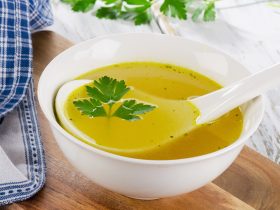A soup diet serves as a short-term eating plan designed to facilitate rapid weight loss. Instead of one unified soup diet, there are various soup-based diets, some centered solely on soup consumption during the diet’s duration, while others incorporate a limited range of permissible foods.
Most of these diets are intended for short durations, typically lasting from 5 to 10 days. This article assesses the different types of soup diets, their advantages and disadvantages, and the effectiveness of soup diets for weight loss.
Types of Soup Diets
Several types of soup diets are available, with some of the more popular ones outlined below. However, it’s essential to note that there is currently no scientific research confirming the effectiveness of these specific diets.
Broth-Based Soup Diet
A typical broth-based soup diet spans seven days, although some variations may extend up to 10-14 days. Advocates of this diet claim weight loss of up to 10 to 20 pounds (4.5 to 9 kg) during this period. The diet restricts cream-based soups due to their higher calorie and fat content, emphasizing homemade or canned broth-based soups containing vegetables and protein. Some programs allow small portions of low-calorie options like lean proteins, non-starchy vegetables, and nonfat dairy.
Bean Soup Diet
A prominent bean soup diet is associated with Michael Greger, MD, author of “How Not to Die: Discover the Foods Scientifically Proven to Prevent and Reverse Disease.” This diet encourages the consumption of Dr. Greger’s Champion Vegetable Bean Soup up to twice a day, along with oil-free, plant-based foods such as whole grains, fruits, and vegetables. While calorie intake is not strictly restricted, the diet suggests limiting calorie-dense foods like dried fruits and nuts for optimal weight loss.
Unlike other soup diets, Greger’s plan aims to instill a lifelong shift towards a plant-based diet, with proponents claiming potential weight loss of 9 to 16 pounds (4 to 7 kg) within the first week. Although no specific research exists on Greger’s bean soup diet, plant-based diets have demonstrated weight loss and heart health benefits.
Cabbage Soup Diet
The cabbage soup diet is one of the most popular soup diets, lasting for seven days. It entails consuming a chicken- or vegetable-broth-based soup containing cabbage and other low-carb vegetables. In addition to the cabbage soup, participants can incorporate one or two other low-calorie foods, such as skim milk or leafy greens. By closely adhering to the meal plan, the diet suggests potential weight loss of up to 10 pounds (4.5 kg) within the seven-day period.
Chicken Soup Diet
The chicken soup diet is a week-long weight loss regimen that revolves around the consumption of chicken soup for every meal, excluding breakfast. For the morning meal, you have a choice of five low-calorie options, including nonfat milk and yogurt, fat-free cheese, whole-grain cereal or bread, and fresh fruit. Throughout the day, the diet recommends frequent small servings of homemade chicken soup to curb cravings and promote a sense of fullness. The soup itself is low in both calories and carbohydrates, composed of broth, cooked chicken, aromatic ingredients like garlic and onion, and an assortment of non-starchy vegetables such as carrots, turnips, broccoli, and collard greens.
Keto Soup Diet
Tailored for individuals adhering to ketogenic (keto), paleo, Whole30, or other low-carb diets, the keto soup diet claims it can facilitate a weight loss of up to 10 pounds (4.5 kg) within just five days. Similar to the standard keto diet, this soup-based variation emphasizes a low-carb, high-fat, and moderate-protein dietary approach.
The program offers a daily calorie intake of 1,200–1,400 calories, limits carbohydrate consumption to 20 grams per day, and restricts the intake of nuts, dairy products, and artificial sweeteners. The diet suggests a consistent breakfast featuring eggs, butter, bacon, avocado, and unsweetened bulletproof coffee.
Additionally, it allows for one low-carb, high-fat snack, such as celery with keto-friendly tuna salad. The remainder of the day is devoted to consuming four servings of keto soup, divided between lunch and dinner. The soup recipe incorporates ingredients like chicken, bacon, olive oil, chicken broth, sun-dried tomatoes, mushrooms, and other low-carb vegetables and herbs.
Sacred Heart Soup Diet
Resembling the cabbage soup diet, the Sacred Heart soup diet entails a seven-day eating plan primarily centered around a broth-based soup infused with non-starchy vegetables. While the diet permits other low-calorie foods, it prescribes specific daily inclusions. When strictly followed, the Sacred Heart soup diet professes the potential for a weight loss of 10–17 pounds (4.5–8 kg) within one week.
Are Soup Diets Effective for Weight Loss?
Studies indicate that individuals who regularly incorporate soup into their diets tend to have a lower body mass index (BMI) and a reduced likelihood of obesity compared to those who do not consume soup. The precise mechanism behind this association remains unclear, but some research suggests that soup may enhance feelings of fullness, potentially leading to a decrease in daily calorie intake.
However, it’s crucial to consider other factors that could contribute to this relationship, such as cultural or genetic distinctions between individuals who frequently include soup in their meals and those who do not.
More comprehensive and long-term studies are necessary to substantiate soup consumption’s potential weight loss advantages. It’s important to note that soup consumption has not been shown to reduce the risk of metabolic syndrome, a cluster of conditions that heighten the risk of heart disease and type 2 diabetes.
There is currently no scientific evidence supporting specific soup diets’ effectiveness for weight loss. Nevertheless, since most soup diets significantly reduce calorie intake, they are likely to result in weight loss. Generally, the fewer calories you consume on a soup diet, the more weight you will shed.
However, it is worth noting that most of the weight lost during the 5 to 10-day duration of these diets is typically due to water loss rather than fat reduction. Additionally, because these diets are typically short-term, the lost weight will probably be regained unless a sustainable long-term weight loss plan is adopted.
The bean soup diet, which encourages a transition to a plant-based eating pattern, may offer better prospects for long-term success than other soup diets.
Potential Benefits
Soup diets may offer several potential advantages beyond rapid weight loss, including:
Increased Vegetable Intake: Soup diets often incorporate a variety of vegetables, providing essential vitamins and beneficial plant compounds. Enhanced vegetable consumption has been associated with a reduced risk of weight gain and obesity.
Increased Fiber Intake: These diets are typically rich in vegetables and may also include beans, whole grains, or fruits, which can contribute to a significant fiber intake. Higher fiber consumption may aid in appetite control.
Increased Water Intake: Soup diets can lead to greater daily water intake. Adequate hydration supports various essential bodily functions and may assist in weight loss efforts.
Ease of Adherence: Like other popular diets, soup diets typically come with clear guidelines, making them relatively easy to follow.
Promotion of Plant-Based Eating: Certain soup diets, such as the bean soup diet, encourage a shift toward a more plant-based dietary pattern. A plant-based diet has been associated with a lower risk of obesity and support for weight loss.
However, it’s important to note that experiencing the benefits of increased vegetable intake, higher fiber intake, and improved hydration over just one or two weeks is unlikely to yield significant long-term benefits for weight management and overall health unless following the diet facilitates lasting lifestyle changes.
Downsides
With the exception of Greger’s bean soup diet, one of the primary drawbacks of soup diets is their short-term nature, typically not intended to be followed for more than 5–10 days. Consequently, without a sustainable dietary plan to transition to, it’s probable that any weight lost during the diet will be regained.
Moreover, research indicates that when calorie intake is drastically restricted or a substantial amount of weight is lost rapidly, there tends to be a decrease in metabolic rate. This means that the body starts burning fewer calories per day than it did previously. Consequently, once the diet is discontinued, the reduced metabolism may pose challenges in maintaining the weight loss.
Additionally, soup diets like the cabbage soup diet and Sacred Heart diet are quite restrictive in terms of permitted food types and quantities. This raises concerns about potential nutrient deficiencies. While following a restricted diet for just 5 to 10 days is unlikely to result in severe nutrient deficiencies, especially if supplemented with a multivitamin, significant calorie reduction can lead to side effects such as dizziness, weakness, or fatigue.
The Bottom Line
Soup diets have gained popularity for their capacity to facilitate substantial weight loss within a short timeframe, typically spanning 5 to 10 days.
However, it’s important to recognize that the majority of weight lost during these diets is primarily attributable to a reduction in water weight rather than fat loss.
Moreover, since these diets are intended for brief periods, any weight shed will likely be regained once the diet concludes.
Instead, considering that soup consumption can contribute to appetite suppression and a reduction in overall daily calorie intake, a more effective approach may involve integrating soups into a well-balanced, less restrictive weight loss eating plan to attain long-term success.















Find Us on Socials